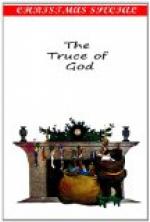“A prosperous year,” said Philip.
Charles grunted.
“We shall have snow before night,” said Philip.
“Humph!” said Charles and glanced toward the sky, but made no move to go.
“The child is growing.”
To this Charles made no reply whatever and Philip bleated on. “Her mother’s body,” he said, “but your eyes and hair, cousin.”
Charles could stand no more. He pushed the child away and rose to his feet. Philip, to give him no tithe of advantage, rose too.
“Now,” said Charles squarely, “where is my wife? Is she hiding from me?”
Then Philip’s face must grow very grave and his mouth set in sad lines.
“She is ill, Charles. I would have told you sooner, but you lacked interest.”
Charles swallowed to steady his voice.
“How—ill?”
“A short and violent illness,” said Philip. “All of last night the women have been with her, and this morning—” He glanced toward the window. “I was right, as you see, cousin. It is snowing.”
Charles clutched him by the arm and jerked him about. “What about this morning?” he roared.
“Snow on Christmas,” mused Philip, “prophesies another prosperous year.” Then having run his quarry to earth, he showed mercy.
“Would you like to see her?”
Charles swallowed again, this time his pride.
“I doubt if she cares to see me.”
“Probably not,” said Philip. “Still a few words—she is a true woman, and kindly. Also it is a magnanimous season. But you must tread softly and speak fair. This is no time for a high hand.”
Charles, perforce, must promise mildness. He made the concession with poor grace, but he made it. And in Philip’s eyes grew a new admiration for this hulking cousin and enemy, who ate his pride for a woman. At the entrance to an upper room where hung a leather curtain, he stood aside.
“Softly,” he said through his beard. “No harsh words. Send the child in first.”
So Philip went ponderously away and left Charles to cool his heels and wait. As he stood there sheepishly he remembered many things with shame. Joan, and the violence of the last months, and the Bishop’s averted head. For now he knew one thing, and knew it well. The lady of his heart lay in that quiet room beyond; and the devils that had fought in him were dead of a Christmas peace.
Little cries came to him, Clotilde’s soft weeping, and another voice that thrilled him, filled with the wooing note that is in a mother’s voice when she speaks to her child. But it was a feeble voice, and its weakness struck terror to his soul. What was this thing for which he had cast her away, now that he might lose her? His world shook under his feet. His cousin and enemy was, willy-nilly, become his friend. His world, which he had thought was his own domain, as far from his castle as the eye could reach and as far again, was in an upper room of Philip’s house, and dying, perhaps.




